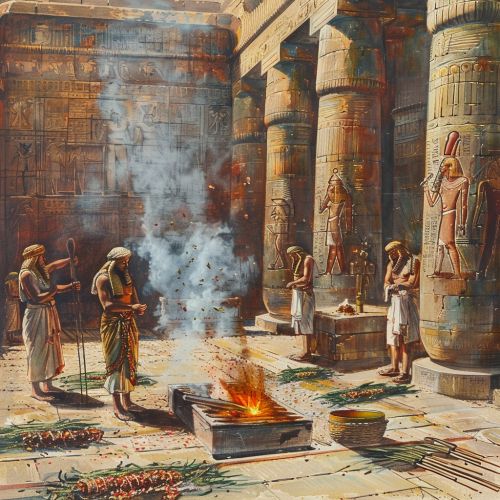The Sacrifice
Introduction
The concept of 'The Sacrifice' has been a central theme in various cultures, religions, and philosophies throughout human history. It encompasses a wide range of practices, beliefs, and rituals that involve offering something valuable for a greater purpose or to appease a higher power. This article delves into the multifaceted nature of sacrifice, exploring its historical, religious, psychological, and sociological dimensions.
Historical Context
Sacrifice has been practiced since prehistoric times, as evidenced by archaeological findings. Early humans engaged in rituals to appease deities or spirits, often involving the offering of animals, food, or even human lives. These rituals were believed to ensure favorable outcomes such as good harvests, victory in battles, or protection from natural disasters.
Ancient Civilizations
In ancient civilizations such as Mesopotamia, Egypt, and Greece, sacrifice played a crucial role in religious ceremonies. The Sumerians and Babylonians performed sacrifices to honor their gods, while the Egyptians offered food, animals, and other goods to their deities in elaborate temple rituals. In ancient Greece, animal sacrifice was a common practice, often conducted during public festivals and private ceremonies to gain the favor of the gods.
Mesoamerican Cultures
Mesoamerican cultures, including the Aztecs and Mayans, are well-known for their elaborate and often brutal sacrificial rituals. Human sacrifice was a significant aspect of Aztec religion, believed to nourish the gods and ensure the continuation of the world. The Mayans also practiced human sacrifice, often in conjunction with astronomical events and religious ceremonies.


Religious Significance
Sacrifice holds profound religious significance across various faiths. It is often seen as a means of communicating with the divine, expressing devotion, or seeking atonement.
Abrahamic Religions
In Judaism, the concept of sacrifice is deeply rooted in the Torah, with detailed descriptions of offerings made in the Temple in Jerusalem. The Aqedah, or the binding of Isaac, is a pivotal story that highlights the theme of sacrifice and obedience to God.
In Christianity, the ultimate sacrifice is embodied in the crucifixion of Jesus Christ, who is believed to have died for the sins of humanity. This act of self-sacrifice is central to Christian theology and is commemorated through the Eucharist.
In Islam, the practice of Qurbani during Eid al-Adha commemorates the willingness of Ibrahim (Abraham) to sacrifice his son in obedience to God's command. Animals such as sheep, goats, and cows are sacrificed, and the meat is distributed among family, friends, and the needy.
Hinduism and Buddhism
In Hinduism, sacrifice, or Yajna, is an essential ritual that involves offerings to deities through fire. These rituals are believed to maintain cosmic order and bring prosperity. The Bhagavad Gita emphasizes the importance of selfless sacrifice and duty.
In Buddhism, the concept of sacrifice is more symbolic, focusing on the renunciation of desires and the practice of compassion. The story of Prince Vessantara, who gave away all his possessions, including his children, exemplifies the ideal of selfless giving.
Psychological Perspectives
From a psychological standpoint, the act of sacrifice can be understood through various theories and frameworks.
Altruism and Self-Sacrifice
Altruism involves selfless concern for the well-being of others, often leading to acts of sacrifice. Psychological theories such as Kin Selection and Reciprocal Altruism explain why individuals may sacrifice their own interests for the benefit of others, particularly kin or those who may reciprocate in the future.
Cognitive Dissonance
The theory of Cognitive Dissonance, proposed by Leon Festinger, suggests that individuals experience psychological discomfort when their actions conflict with their beliefs or values. Sacrifice can serve as a means to reduce this dissonance, aligning actions with deeply held convictions.
Maslow's Hierarchy of Needs
According to Maslow's Hierarchy of Needs, self-actualization represents the highest level of psychological development, where individuals strive to realize their full potential. Acts of sacrifice can be seen as expressions of self-actualization, where individuals transcend their basic needs to achieve higher goals.
Sociological Dimensions
Sacrifice also has significant sociological implications, influencing social structures, norms, and relationships.
Social Cohesion
Sacrificial rituals often serve to strengthen social cohesion within communities. By participating in shared rituals, individuals reaffirm their collective identity and reinforce social bonds. This is evident in communal sacrifices during religious festivals, where the act of giving and sharing fosters a sense of unity.
Power and Control
Sacrifice can also be a means of exerting power and control. In many societies, religious and political leaders have used sacrificial rituals to legitimize their authority and maintain social order. The ability to demand and orchestrate sacrifices often signifies a position of power.
Symbolic Interactionism
From the perspective of Symbolic Interactionism, sacrifice is a form of symbolic communication. The meanings and interpretations of sacrificial acts are constructed through social interactions and cultural contexts. This framework helps explain the diverse forms and significance of sacrifice across different societies.
Ethical Considerations
The practice of sacrifice raises various ethical questions and debates.
Animal Rights
The use of animals in sacrificial rituals has been a contentious issue, particularly in the context of modern animal rights movements. Critics argue that such practices are inhumane and advocate for the protection of animal welfare. This has led to changes in some religious practices, where symbolic or non-violent forms of sacrifice are adopted.
Human Sacrifice
Human sacrifice, though largely obsolete, remains a topic of ethical concern. Historical instances of human sacrifice are often viewed through a critical lens, questioning the morality and justification of such acts. Modern human rights principles categorically reject any form of human sacrifice.
Environmental Impact
The environmental impact of sacrificial practices, particularly those involving large-scale animal slaughter, is another area of ethical consideration. Issues such as waste management, resource consumption, and ecological balance are increasingly relevant in contemporary discussions on sacrifice.
Modern Interpretations
In contemporary society, the concept of sacrifice has evolved, often taking on metaphorical or symbolic meanings.
Personal Sacrifice
Personal sacrifice is commonly understood as the act of giving up one's own interests or comforts for the benefit of others. This can manifest in various forms, such as parents sacrificing for their children, individuals dedicating themselves to social causes, or professionals working tirelessly for the greater good.
National and Military Sacrifice
The notion of sacrifice is also prevalent in the context of national and military service. Soldiers who risk or lose their lives in the line of duty are often honored for their ultimate sacrifice. Memorials, ceremonies, and commemorations serve to recognize and remember their contributions.
Economic and Social Sacrifice
Economic and social sacrifices are evident in situations where individuals or groups forgo immediate gains for long-term benefits. This can include saving money for future investments, enduring hardships for educational attainment, or advocating for social justice despite personal risks.
